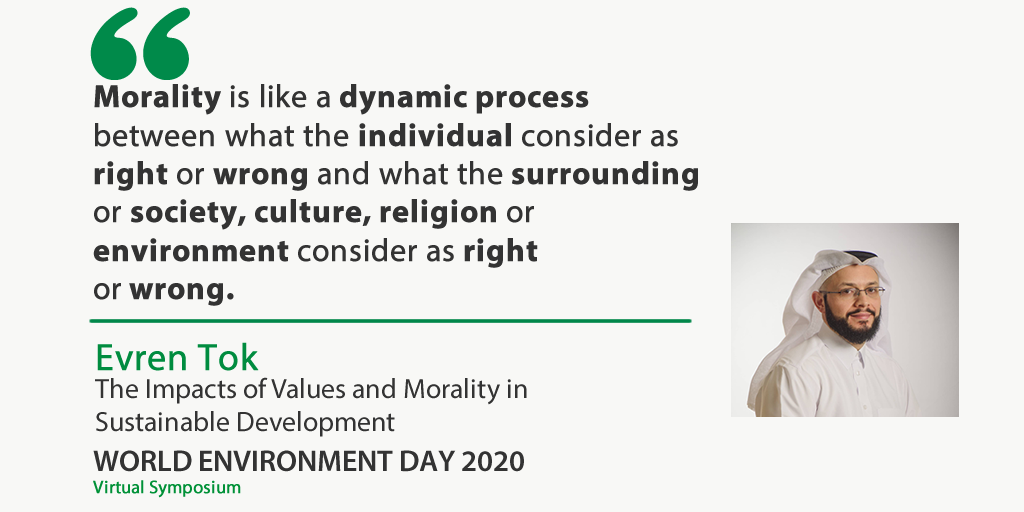Summary of the Event
The event kicked off at 7am GMT with a morning yoga video performed by Adriene.The Virtual Symposium hosted over 25 renowned sustainability leaders, environmentalists, researchers, specialists on health, botanic conservation, resource management sustainable agriculture and building from around the world. Speaker such as Jeffrey Sachs, Adenike Akinsemolu, Marc Rosen, amongst others share their insights on our path towards sustainable development.
LISTEN TO PODCAST
ABOUT THE SPEAKER
Dr. M. Evren Tok is the Associate Professor and Program Coordinator for the MA program in Islam and Global Affairs at the College of Islamic Studies (CIS) and the Assistant Dean for Innovation and Community Development.
ABOUT THE MODERATOR
S. Duygu Sever is a passionate researcher who works on the intertwined relationship between energy politics, sustainability and human security. She is a PhD Candidate in Political Science and International Relations at Koç University, Turkey.
Q & A (SELECTED)
Dugyu Sever: How do you think we can establish and sustain social values and morality despite differing cultures, beliefs, and ethnicities?
Evren Tok: In terms of values and moralities within this type of multicultural, multiethnic and multinational and complex environment which are actually globalised and also same time transnational, translocal, we can see there are different types of identity that are in place. So it is not really a motivation as to think of a common approach to design a project. In reality we can actually look for how there can be areas that we can identify common denominators and all these denominators can be tri-discussed in a deliberate confession and afterwards this can actually resolve in distilled into certain kind like of not responses or behavior that area quite localized. It’s been kind of a cliché that people are saying I’m global but is saying I’m local but I’m saying I’m global but act local. How individuals, groups, communities regardless of their race, nationality, gender, age, we are all in the same box, is one thing that has been learnt in this time of corona. One way of showcasing that we are really in the same boat is by creating those scales of action, space that we can act jointly. This is the section that values and morality comes into the picture because we don’t often realize the commonality but we often star the differences. I believe in order to act together or start a prolific action whether it is COVID-19, environmental change, climate change, global warming or racism, any kind of action requires core beliefs and values at the initial stage, even though there are a lot of differences, so that the difference can build on commonalities.
Dugyu Sever: What is the morality in terms of areas of inequality, food, electricity, health care in sustainable development?
Evren Tok: Morality in Turkish, Arabic it intertwine with the term ‘Ethical Behavior’ Morality is what people see as the right thing to do from a person standpoint. In my view, morality is more like a path or a dynamic process between what the individual considers as right or wrong and what the surrounding ,like the environment, society, institution, social, culture and religious environment that the individual is embedded in institute as right or wrong. Morality is more like multidimensional, continuous discussion or corporative kind of process that is always continuously redefined.
Sabika Shaba (Audience): Do you believe the level of moral consciousness in the world is rising or falling in your own opinion? Why could this be?
Evren Tok: Making reference to the famous study of UNESCO, the citizen education because morality is more embedded in this study. The fourth element for sustainable development in the report of the citizenship education emphasizes on is the ‘values formation’ which they divided into two areas, most important one is the early family socialization and cultural grouping like taking your children to specific event, giving them training on planting trees because when we are young our brain are like sponge, it kind of absorb everything. So this is one way to instill values to the youth. These three elements; social, emotional, and behavior that is basis of the moral consciousness.
Quotes
“One way of showcasing that we are really in the same boat is by creating those scales of action, space that we can act jointly.”
FURTHER READING
Evren Tok. (2017). Sustainable Development and the Rule of Law: A Policy Perspective from Qatar. MEI Rule of Law Insights.
Ha-Brookshire, Jung & McAndrews, Laura & Kim, Jooyoun & Freeman, Charles & Jin, Byoungho & Norum, Pamela & Lehew, Melody & Karpova, Elena & Hassall, Lesya & Marcketti, Sara. (2017). Moral Education for Sustainable Development: Exploring Morally Challenging Business Situations within the Global Supply Chain Context. Sustainability.




